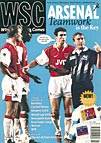 After again falling to win promotion, Charles Ross looks at the reasons that Wolves continue to underachieve despite Sir Jack Hayward's financial muscle
After again falling to win promotion, Charles Ross looks at the reasons that Wolves continue to underachieve despite Sir Jack Hayward's financial muscle
"There's been too much sloppiness and too much disregard for money. They've thought the Golden Tit – me – would go on forever. When I see some of the players we've bought who haven't performed, haven't had the commitment, overpaid, got their sports cars… they've let the fans down, let me down…"
Thus spoke Sir Jack Hayward the day after the play-off defeat against Crystal Palace last May. A stunning – but fair – indictment. Now 74, what had he got to show for the £35 million or so his family had pumped into Wolves since the early Nineties? A fabulous stadium and, er…
Up until last August, the policy had been one of throwing money at the team; Mark McGhee spent £5 million in his first eight months alone. So a degree of frustration among supporters was understandable when the team was beaten into second place and automatic promotion by a Barnsley squad that had cost under £1 million to assemble (less than we’d paid Villa for Tony Daley or paid in wages to the likes of Daley and Geoff Thomas).
You might have thought that a First Division side which hasn’t seen a league gate under 20,000 since 1993 (in which time season ticket prices have doubled) might be in a relatively healthy position. ’Fraid not. The last set of published accounts (1995-96) saw Wolves win a title of sorts – for the worst operating loss in the country, Premiership clubs included. Their turnover was £10.5 million, the wages bill £6.2 million, pretax loss £7.1 million, net liabilities £16.8 million. All in a year of zero stadium expenditure. To give those numbers a context, the turnover of the average First Division club that year was £4.3 million. Last season’s figures are expected to make similarly gruesome reading. Money buys you many things. Or not, in some cases – only Wolves could end up spending £250,000 on a player, Zeljko Kalac, who never played for them. Meanwhile, our transfer strategy of ‘buy dear, sell cheap’ saw a keeper we did have, Paul Jones, offloaded to Stockport for £60,000. Wonder where he is now?
So the dawning of fiscal reality this year was long overdue. Jonathan Hayward, responsible for the appointment of McGhee, was replaced as chairman by his father Sir Jack, hitherto president. Former Wolves great John Richards has recently been appointed managing director. Whilst any transfer dealings now have to be self-financing, Sir Jack’s wallet hasn’t exactly been padlocked, witness his recent clearing of the club’s overdraft (another £5 million into the black hole).
Thus far, attempts to find a serious outside investor to take a stake in Wolves have come to, as it were, nought. But then who would want a minority shareholding in a family-owned business with no immediate prospect of growth? Similarly, flotation has receded as a likelihood since those bright City analysts worked out that not all football clubs can win trophies and downgraded valuations accordingly.
Back on the field, the annual battle against promotion started earlier than usual, not least since the FA Cup reared its head. Perhaps McGhee has seen the Cup as the best chance of saving his managerial skin. It’s no secret that Sir Jack has always said that his remaining ambition in life is to see Wolves lift the Cup at Wembley. The Wembley win I’d most like to see, however, is at the end of May, in the play-offs.We haven’t played in the top flight since 1983-84 – together with Portsmouth, Wolves are the longest serving current members of the First Division – so a return would hardly be premature.
During our tenure in this division, we’ve seen Derby go up after Lionel Pickering put an end to their own version of monopoly money madness and Leicester after a certain manager walked out on them. All of which tends to suggest that good management and hard work have as much to do with it as money. The problem at Wolves has been that a culture of complacency had infected the squad, filled with far too many players on the way down in search of a cushy last payday. Finally we’re now starting to see the emergence of younger, hungrier players like Robbie Keane, Lee Naylor and Carl Robinson. Ironically, the greater emphasis on our youth policy was begun by Graham Taylor and those responsible for identifying and developing these youngsters have largely, and reluctantly, decamped first to Watford and now to Blackburn.
Wolves have blown their best chance of promotion. For a while, the Hayward money and our gates gave us unrivalled spending power in the division. That plus a centre forward now with 300 goals in an old gold shirt should have been enough. Now, however, the new Sky deal for Premiership clubs and the additional cushion provided for the poor unfortunates who get relegated to the Nationwide means that Wolves are no longer the rich kids of the division. Instead we’ll have to do to others what the Leicesters and Barnsleys have done to us: rely a bit more on what all 11 players can do for 90 minutes, 46 times a season.
From WSC 135 May 1998. What was happening this month